Russian invasion of Ukraine ‘imminent’ as the Kremlin threatens US with retaliation
Russia has promised to retaliate if the US and its allies do not retreat and if Ukraine and other ex-Soviet nations are admitted to NATO.
Russia has threatened to take “retaliatory measures” if the US and its allies continue their “aggressive course” and reject its security demands over NATO and Ukraine, amid concerns from the West that Moscow is planning to invade its neighbour.
The Kremlin, which has stationed more than 100,000 troops along its border with Ukraine and has conducted a series of sweeping military drills, denies it is preparing to launch an invasion, saying instead it is countering military actions by the US and its European allies.
Russia’s military manoeuvres have seen motorised infantry and artillery units in southwestern Russia practise firing live ammunition, warplanes in Kaliningrad on the Baltic Sea perform bombing runs, dozens of warships sail for training exercises in the Black Sea and the Arctic, and Russian fighter jets and paratroopers arrive in Belarus for joint war games.
Russia demanded that the US provide written guarantees that Ukraine and other former Soviet bloc states would never be allowed to join NATO, and wants the Western alliance to roll back troop deployments in Eastern Europe.
The US response was delivered in person to the Russian Ministry of Foreign Affairs by US Ambassador to Russia John Sullivan, Secretary of State Antony Blinken announced on Wednesday afternoon.
Mr Blinken said the US response to Russia “sets out a serious diplomatic path forward should Russia choose it,” adding that he expects to have a follow-up discussion with Russian Foreign Minister Sergey Lavrov in the coming days now that the document has been received in Moscow.
“The document we’ve delivered includes concerns of the United States and our allies and partners about Russia’s actions that undermine security, a principled and pragmatic evaluation of the concerns that Russia has raised, and our own proposals for areas where we may be able to find common ground,” Mr Blinken added.
Mr Blinken declined to provide further details about what the US presented to Moscow, but said the US response reiterated what they will uphold NATO’s “open-door policy,” rejecting Moscow’s demands that NATO commit to never admitting Ukraine.
“There will be no change,” he said.
Earlier, Mr Lavrov said he and other top officials will advise President Vladimir Putin on the next steps after receiving written replies from the US to the demands.
“If the West continues its aggressive course, Moscow will take the necessary retaliatory measures,” Mr Lavrov told politicians.
But he indicated Russia wouldn’t wait forever.
“We won’t allow our proposals to be drowned in endless discussions,” he said.
He mocked fears of an imminent invasion, saying that “our Western colleagues have driven themselves up into a militarist frenzy,” adding sardonically that “the Ukrainian elite itself has grown a bit scared by the Western scare.”
RUSSIAN INVASION OF UKRAINE ‘IMMINENT’
The US has warned Moscow of damaging sanctions, including measures personally targeting Vladimir Putin, if it moves ahead with an invasion of Ukraine, as Russian combat troops massing around the pro-Western country launched new exercises.
Tension appeared to be increasing, with the White House saying the risk of a Russian invasion of Ukraine “remains imminent.”
Warning that such a move would prompt “enormous consequences” and even “change the world,” President Joe Biden said he would consider adding direct sanctions on Putin to a raft of measures being drawn up.
“Yes. I would see that,” Biden said when asked by reporters in Washington about targeting the Russian president, whom opponents have long accused of holding gigantic, secret wealth.
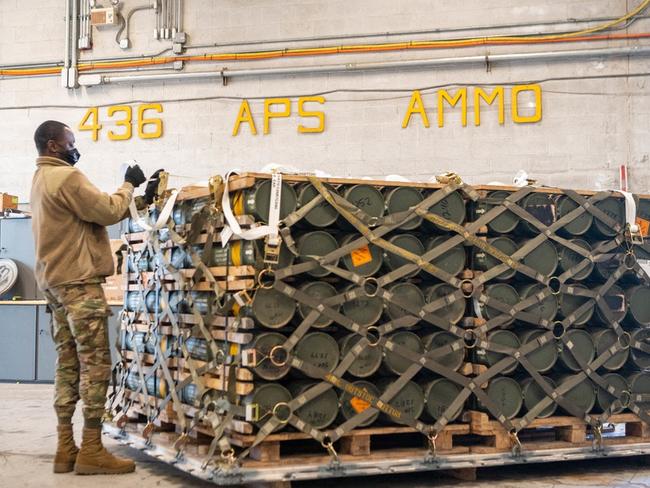
A senior US official laid out economic sanctions “with massive consequences” that go far beyond previous measures implemented in 2014 after Russia invaded Ukraine’s Crimea region.
New measures would include restrictions on exports of high-tech US equipment in the artificial intelligence, quantum computing and aerospace sectors, the official told reporters on condition of anonymity.
“What we’re talking about are sophisticated technologies that we design and produce,” and cutting them off would hit Putin’s “strategic ambitions to industrialise his economy quite hard,” the official said.
British Prime Minister Boris Johnson echoed the threat, saying sanctions would be “heavier than anything we’ve ever done.”
The US has placed about 8500 defence personnel on “heightened alert”, Pentagon spokesman John Kirby said on Monday local time.
“The United States has taken steps to heighten the readiness of its forces at home and abroad so they are prepared to respond to a range of contingencies, including support to the NATO Response Force if it is activated,’” Mr Kirby said.
No decisions have been made to deploy any forces yet.
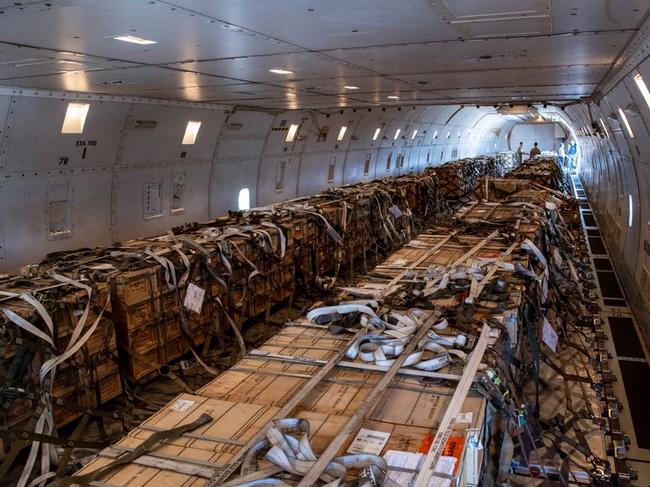
French President Emmanuel Macron said he would talk by telephone with Putin on Friday, seeking “clarification” on Moscow’s intentions.
Mr Macron warned Russia that it will face tough consequences if it attacks Ukraine, insisting that Paris was united with Berlin on the need for a de-escalation.
“If there is an attack, there will be retaliation and the price (for Russia) will be very high,” Mr Macron said on Tuesday, alongside German Chancellor Olaf Scholz, urging a “de-escalation” and saying the two countries were “united” on this.
Australians have been urged to immediately leave Ukraine after NATO announced a military build-up in eastern Europe amid fears of conflict with Russia.
Russia responded by saying the risk of conflict in Ukraine was “very high” after NATO announced the military build-up.
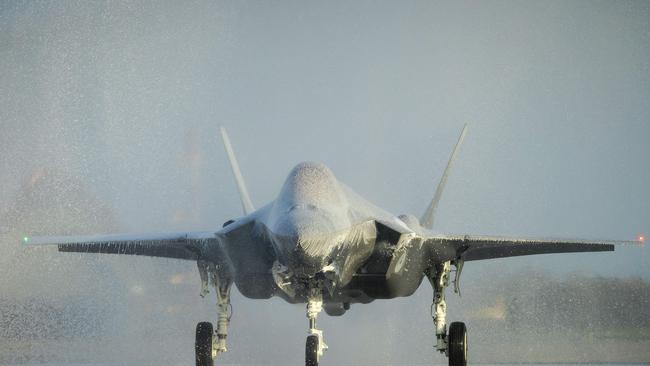
The Department of Foreign Affairs pulled families of diplomats from the Australian embassy in Kiev and updated its travel advice to “Level 4” “reflecting the increased risk of armed conflict”.
DFAT said in a statement that Australians who do not leave now face the risk of missing available flights, and those remaining in the country should prepare to “shelter in place”.
“Security conditions can change at short notice. Consular services and our ability to provide consular assistance to Australians may be limited due to local circumstances,” the statement said.
“Australians who decide to remain in Ukraine should review their personal security plans, be prepared to shelter in place if required, maintain heightened security awareness and register with DFAT.”
AUSTRALIA’S PLAN FOR UKRAINE REVEALED
Australia won’t send military assistance to Ukraine, but is considering cyber security support if Russia does not back down.
Australia’s Foreign Affairs Minister Marise Payne said the security situation was “unpredictable”, and that while Australia was in full support of Ukraine’s sovereignty, Australian defence personnel would not be sent.
“We have said that we will not be taking part, or would not take part in relation to military assistance,” Senator Payne told RN Breakfast on Tuesday.
“I spoke with the Foreign Minister of Ukraine last week in a very constructive conversation, and I had further consultation with Australia’s ambassador in Kiev on Friday
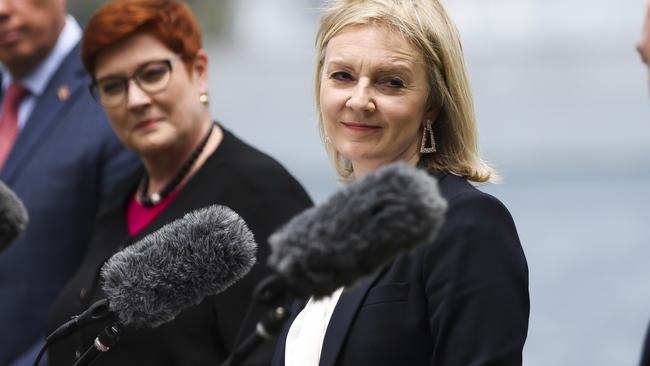
“We are asking our ambassador for Cyber Affairs and Critical Technology, Dr Toby Feakin, to discuss possible avenues of assistance from Australia to the Ukrainian government.
“In the cyber context there has been significant cuber attack already in the Ukraine, understood to have come potentially from Russian sources. And to be very clear, this is a challenge that they have been dealing with for some time.
“If Australia can assist in that regard, we will.”
Senator Payne said Australia, like its allies, had a very “clear and strong message” for Russian President Vladimir Putin.
“We call upon Russia to take steps to de-escalate the situation,” she said.
“We are deeply concerned by the military build-up on Ukraine’s border … This sort of behaviour is completely unacceptable from authoritarian regimes. It is not a case of might outweighs all in terms of exercise of power.
“This is unacceptable behaviour.”
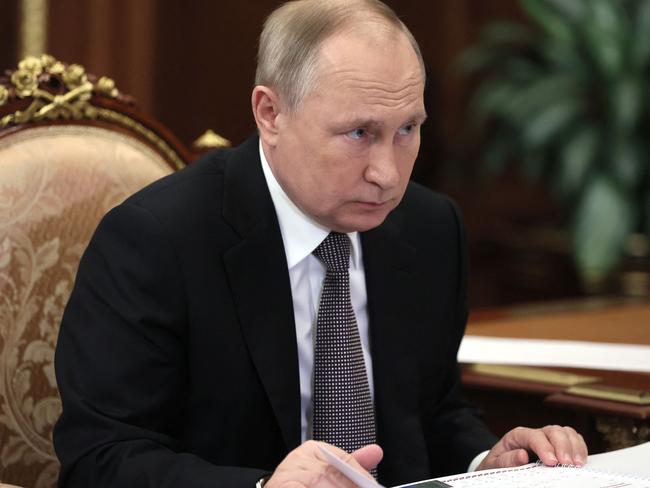
Australia is one of a number of countries, alongside the UK, United States and Canada who have enacted sanctions against Russia, in the hopes of deterring further military action.
Senator Payne said there was room for more sanctions, and that had been a point of discussion with the UK Foreign Secretary during her visit to Australia last week.
“They (sanctions) are a potential tool Australia can use in concert with like minded to indicate and to convey very strong concerns about such aggressive behaviour,” she said.
Meanwhile, Labor is asking the Morrison government to work in a “bipartisan way” to condemn Russia and ensure Ukraine’s sovereignty.
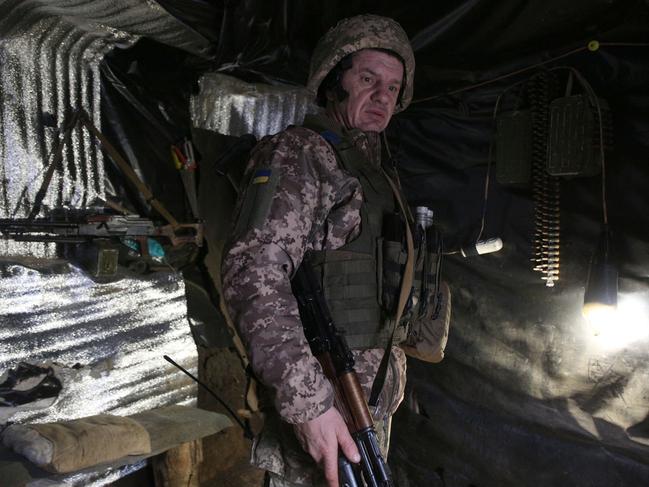
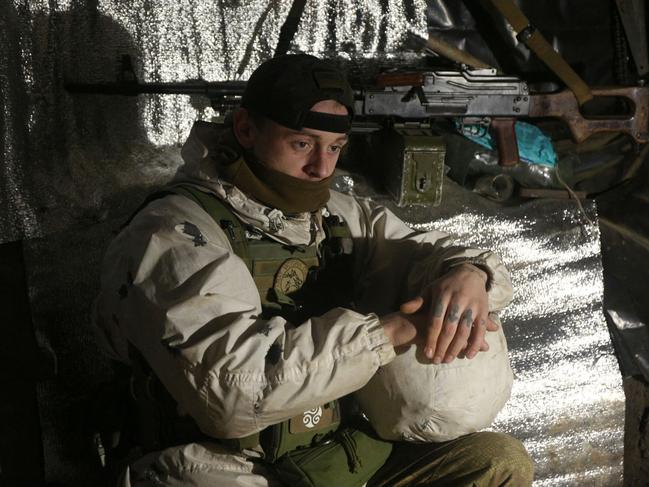
Tanya Plibersek said Labor wanted to work closely with the government.
“I think that it is very important that the government say what more Australia is prepared to do to support the sovereignty and independence of Ukraine,” she told ABC News.
“Labor wants to work closely with the Morrison government to make sure that that message is sent loud and clear.
“In an election year, it’s important hat we do this in a bipartisan way. That the government keep us up to date in any measures that they’re considering taking, and we would seek to work cooperatively with them.
“These things are too big for domestic politics … and could have global implications.”
‘VERY HIGH’ RISK OF AN OFFENSIVE: RUSSIA
As the West accused Russia of escalating tensions, the Kremlin said “information hysteria” and NATO’s “concrete actions” mean a “very high” risk of an offensive by Ukrainian troops against pro-Russian separatists in the east of the country.
Kremlin spokesman Dmitry Peskov said Russian President Vladimir Putin was taking “necessary measures” to protect the country in response to the announcement by NATO.
“We live in an aggressive environment,” Peskov told reporters during a conference call.
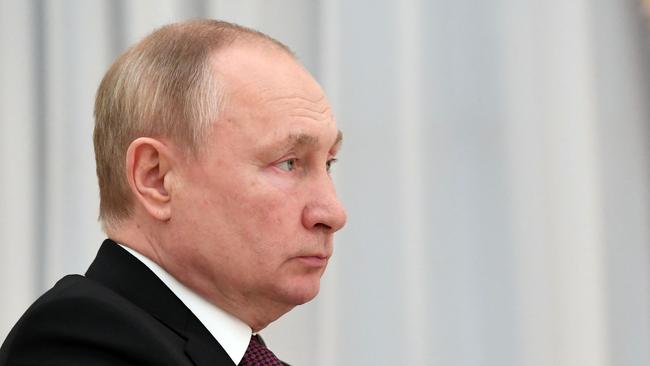
NATO said earlier Monday local time it had put forces on standby and sent ships and fighter jets to bolster Europe’s eastern defences in response to Russia’s military build-up around Ukraine.
NATO said that Denmark recently sent a frigate and warplanes to the Baltic States while Spain bolstered naval deployments.
The Netherlands put a “ship and land-based units on standby” for its rapid response force and will deploy two F-35 fighter aircraft to Bulgaria in April.
France has advised against non-essential travel to Ukraine and has offered to send troops to Romania.
“The United States has also made clear that it is considering increasing its military presence”, NATO Secretary-General Jens Stoltenberg said in a statement.
“NATO will continue to take all necessary measures to protect and defend all Allies, including by reinforcing the eastern part of the Alliance. We will always respond to any deterioration of our security environment.”
It comes after the US and UK began pulling some staff from embassies in Kiev, which the country’s foreign ministry slammed as “excessive caution”.
The West accuses Moscow of threatening to invade Ukraine by massing over 100,000 troops on its border. Russia denies it is planning an incursion and accuses NATO of advancing towards its borders.
Peskov said on Monday that Ukraine was preparing an offensive in the east of the country where Kiev troops have been fighting pro-Russia separatists since 2014.
“The Ukrainian authorities are concentrating a huge amount of forces and means on the border with the self-proclaimed republics,” he said.
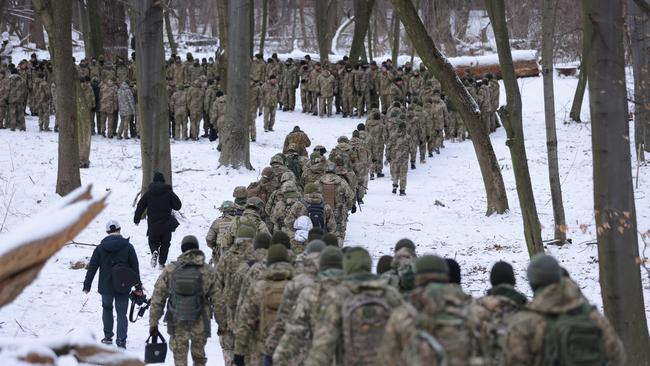
“The nature of this concentration speaks of preparations for an offensive,” he said, adding the risk of such an operation now “is very high, higher than before.”
Several rounds of talks between Russia and the West have so far failed to ease tensions.
The alliance is now preparing a proposal for further talks with Russia after the Kremlin issued a raft of demands that would see NATO stop Ukraine and Georgia from joining and roll back its forces in eastern Europe.
NATO insists it will not negotiate over its “core principles” including defending all allies and allowing partners to chose their own path.
Peskov said Moscow was waiting to receive the written response from Washington and would decide on its further course of action after that.
He did not rule out further talks including new talks between Putin and US President Joe Biden.
“Nothing can be excluded if such a need arises,” he said.


